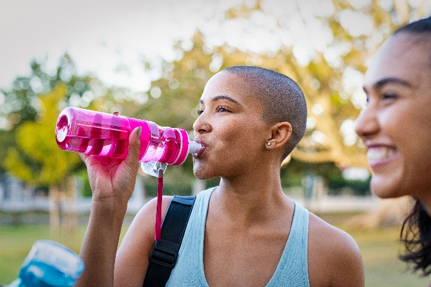Did you know that about 60% of your body is made up of water? In fact, almost 3/4 of the adult brain is made up of … you guessed it, water! Babies have the highest percentage of water weight at over 75%.[3] The percentage declines as the person ages, but the importance of water remains constant.
Why is it important to stay hydrated?
I’m sure you have been told to drink more water, but why is it important to stay hydrated? And why does it make up so much of your body? Water plays a variety of roles; here are a few examples:
- Temperature Control- First, you have likely experienced increased thirst after intense exercise or being outside in the heat all day. This response is due to water loss in the form of sweat. Sweat controls the body’s temperature to keep it in a good range for normal functioning. (NOTE: Thirst is not your best indicator of hydration status, particularly in older adults. Drink water before you get thirsty.)
- Getting Rid of Waste- After you have satisfied that thirst, you will need to use the restroom. Water plays a role in eliminating waste from the blood through urination.
- Protecting Joints and Organs- Water protects your body by acting as a lubricant for your joints. It also acts as a shock absorber for your organs and spinal cord. When you land from a jump, for example, water helps cushion the disks in your spine and the bones in your knees.
Now you get why it’s important to consume enough water…. for these important functions and many more.
So how much water should I be drinking?
It is recommended that adult males get about 15.5 cups of fluids per day and adult females get 11.5 cups per day[1](Table 1).
| Total Fluid Recommendation For Adults | |
| Gender | Total Fluids (Cups/Day) |
| Female | 11.5 |
| Male | 15.5 |
About 20% of the fluid you need will come from the food you eat.[2] Beverages will make up the other 80%. An easy-to-remember goal to reach that 80% is to drink eight 8-oz glasses of water per day.
The exact amount of water each person should drink for adequate hydration depends on a number of factors such as activity level and pregnancy. Recommendations for children’s water intake are in the table below (Table 2).[1]
| Water Recommendations For Kids | ||
| Age | Gender | Total Water (Cups/Day) |
| 4-8 years | Girls & Boys | 7 |
| 9-13 years | Girls | 9 |
| Boys | 10 | |
| 14-18 years | Girls | 10 |
| Boys | 14 | |
Ready to up your water game? Here are 10 tips to help you drink more water:
- Start your day off right– Put a glass of water by your bed and when your alarm goes off in the morning, start your day by drinking water.
- Set healthy habits– Tie water drinking to an already set habit. For example, drink a glass every time you brush your teeth, take your pills, eat a meal, sit down to watch a program, or use the restroom.
- Make it exciting– Try infusing your water to add some flavor and color without adding calories. Check out these recipes for inspiration or let your kids create their own unique flavor combination!
- Take it with you– Carry around a reusable bottle to work or on errands to remind yourself to stay hydrated. This can also help you track how much water you have had that day.
- Get competitive– Start a friendly competition within your family, co-workers, or friends to challenge each other to meet their personal daily goal each week.
- Eat your water– As you read above, some of your water intake comes through the food you eat. Choose water-rich foods for your meals such as zucchini, tomatoes, watermelon, cucumbers, oranges, and celery.
- Swap it out– Trade out one sugary beverage per week for water. Can you trade out more next week?
- Pair it– If you like drinking tea or coffee throughout the day, try taking one sip of water between each sip of your beverage to up your water intake. You can also drink a glass of water while the coffee brews or tea steeps.
- Fuel your exercise– Bring a water bottle with you when you work out. Be sure to drink water before and after you exercise to account for water loss.
- Chill it– Add ice to your smoothies and beverages to sneak in more water.
Let us know what has worked for you! If any of these tips have helped you drink more water or if you have any hydration hacks of your own, we’d love to hear about it.
Written by Abigail Starcher, Masters Student | Edited by Laurel Sanville, MS, RDN, LD
[1] The National Academies of Science, Engineering, and Medicine, 2005

